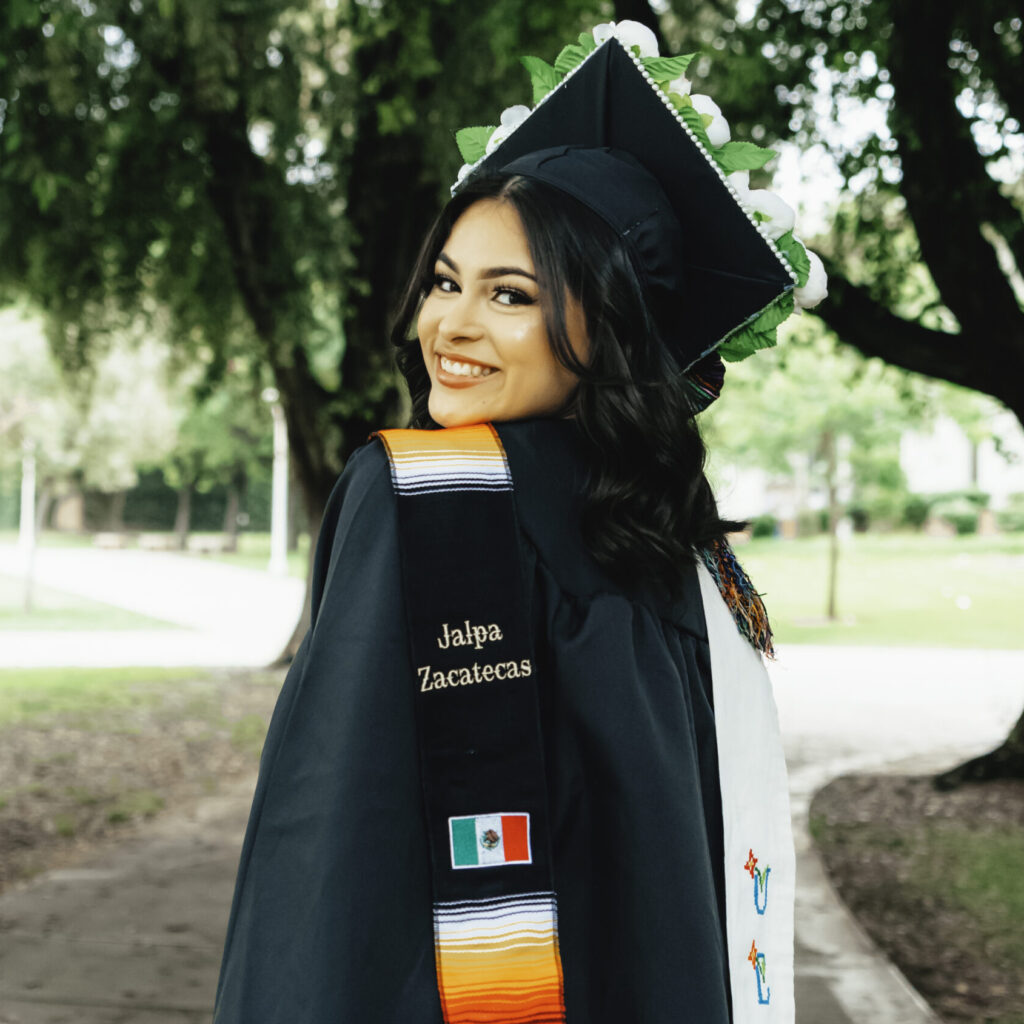


Gen Z Latinas are stepping into the political arena with a passion and purpose that reflect their diverse experiences and aspirations. As the largest generation in the U.S., they wield significant influence, and their voices are crucial in shaping the future. With a deep understanding of the challenges their communities face—such as immigration, education, and healthcare—these young women are advocating for change and harnessing the power of voting to amplify their impact. By participating in elections, Gen Z Latinas are challenging the status quo, breaking barriers, and ensuring that their perspectives are represented in decision-making that affects their lives and those of future generations.
“Gen. Z is not lazy, but rather, we are proactive in seeking change and are willing to show up and vote.” Said Gonzalez.
This is why we wanted to highlight the work of Andrea Gonzalez, a young Latina based in Southern California who is producing an event this week to highlight the importance of Gen Z Latinas getting involved in the electoral process by encouraging the community to get involved and get out the vote.
“I hope for young Latinas to become more involved in politics and challenge gender norms,” says Gonzalez, a second-generation American and first-generation college graduate.
She explains a clear need for more representation in political positions, particularly for Latinas. She believes we must actively work to fill this gap in representation by harnessing the power of education, as education is the most important factor for personal and societal growth.
Join Andrea and others at the Fuerza Latina: GenZ Voting Empowerment Summit on Thursday, September 26, at 5:30 pm PST at Heritage High School for a day filled with inspiring speakers, interactive workshops, and opportunities to learn about the power of your vote. This event is free but requires registration via the Eventbrite link.
Learn more about Andrea Gonzalez:
Andrea is a dynamic and dedicated professional with an impressive track record of leadership and community impact. From an early age, Andrea has been a catalyst for change, earning the CJSF scholarship at just 13 and excelling in academics and extracurricular activities throughout high school.
Andrea’s commitment to excellence continued at the University of California, Riverside, where she earned a B.A. in Media and Cultural Studies and a minor in Feminist Studies in just three years, also studying abroad in London. Her professional journey includes roles as Logistics Committee Head for TEDxUCR, Social Media Marketing Intern, and Content & Editorial Intern at FIERCE By Mitu, where she amplified Latina voices through impactful TikTok content.
Currently, Andrea serves as the Marketing Manager for the Temecula Valley Chamber of Commerce, showcasing community resources, and is also a Social Media Content Creator for Riqueza™ Collective, a company committed to fostering financial empowerment in underserved communities. Additionally, she is a member of the 2024 Emerging Leaders for Liberation Cohort with the American Friends Service Committee, focusing on social justice, public policy, and community organizing. Andrea is also the founder and co-host of the “Empowering You Forward” podcast, which aims to inspire and educate young adults on self-growth, career, and personal empowerment. With her passion for community engagement and empowerment, Andrea continues to make a significant difference in the lives of those around her.
We aim to track Latina elected officials at all levels of government. If you are a current elected official who identifies as Latina and are not currently listed on our map, please submit your information below. Your submission will be reviewed prior to being added to the map.
Source: National Hispanic Leadership Agenda
The word Hispanic is closely tied to the U.S. government and its efforts to identify groups of people, which defines it as “Americans of Spanish origin or descent.” Under this definition, Hispanic only refers to people who are originally from Spanish-speaking countries. This term includes people from Spain but excludes people from Brazil. Although this term is widely used to describe a pan-ethnic Spanish-speaking group of people, it is not universally embraced by the communities who have been labeled as such. Due to its connection to Spanish colonization, some view the term Hispanic as a Eurocentric label that erases the Indigenous and Afro-Latino heritage of people from Latin America.
The terms Latino, Latina, Latin@, Latine, and Latinx refer to a person or group of people of Latin American or Caribbean origin or descent; this includes people from all countries in Latin America and the Caribbean but excludes Spain. When used in the singular form, Latino refers specifically to a man or boy, which is why it is necessary to use the term Latina when referring to women or girls of Latin American origin. The term “Latino” applies to a broader group of people in Spanish because the language is gendered and the masculine forms of words may also be considered gender-neutral, which means that the language itself sets a baseline that is both heterosexual and masculine and by default exclusionary. The term “Latinx” arose out of a desire to have a gender-neutral term and is used to refer to people of Latin American or Caribbean origins and is inclusive of those who identify along a gender spectrum and diverse sexual orientations and gender identities. Latinx term began appearing on the Internet in queer communities in the United States; however, it is not always considered the perfect response to the search for a postcolonial word because it requires an understanding of the English language and tends to highlight people of mestizo identity while erasing Indigenous and Afro-Latino identities. Some also have used the term “Latin@” to be inclusive, using the @ symbol to represent both an O and an A. More recently, “Latine” has emerged as an alternative to Latinx as a gender-neutral term rooted in the Spanish language. It is starting to be used in some parts of Latin America and the Caribbean and is also starting to gain some recognition in the United States.
ngshgjhrjhtrhthhewthejhfjthejhjhtjhewthewthw